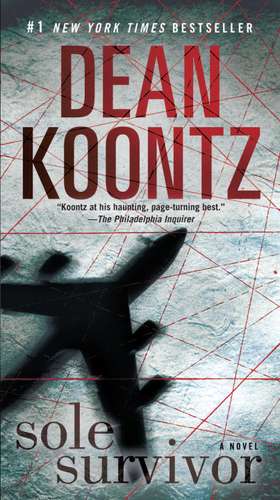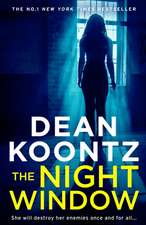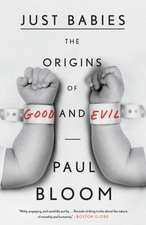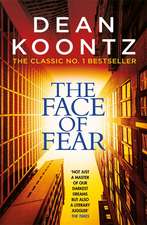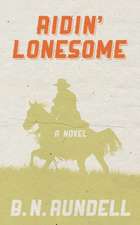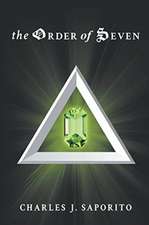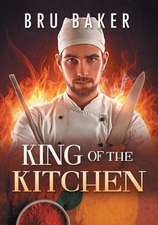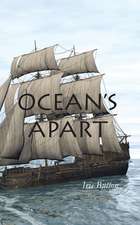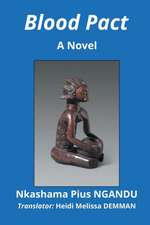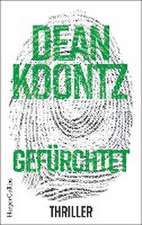Sole Survivor
Autor Dean R. Koontzen Limba Engleză Paperback – 30 iun 2012
The plane crashed without warning. Three hundred and thirty people died. No explanation. No survivors. Now one man who lost everything that night is about to discover the answers he needs to go on with his life—or the conviction to finally end it.
Crime reporter Joe Carpenter lost his wife and two daughters in the crash of Flight 353. Aching from his loss, Joe is unable to work, think, or do anything but grieve, and wait for his own death. Then Joe meets Rose, a woman who claims to be the crash’s sole survivor. But before Joe can probe further, the elusive Rose slips away and Joe is left with haunting, terrifying questions: If Rose lived through the crash, is it possible his family could have survived it, too? Did the authorities conspire to hide what really happened that night? Joe’s search for the truth will shatter him like nothing has before—and force him to question everything he thinks he knows about life and death.
Preț: 57.71 lei
Nou
Puncte Express: 87
Preț estimativ în valută:
11.04€ • 11.41$ • 9.19£
11.04€ • 11.41$ • 9.19£
Carte indisponibilă temporar
Doresc să fiu notificat când acest titlu va fi disponibil:
Se trimite...
Preluare comenzi: 021 569.72.76
Specificații
ISBN-13: 9780345533449
ISBN-10: 0345533445
Pagini: 403
Dimensiuni: 108 x 192 x 29 mm
Greutate: 0.23 kg
Editura: Bantam
ISBN-10: 0345533445
Pagini: 403
Dimensiuni: 108 x 192 x 29 mm
Greutate: 0.23 kg
Editura: Bantam
Notă biografică
Dean Koontz, the author of many #1 New York Times bestsellers, lives in Southern California with his wife, Gerda, their golden retriever, Anna, and the enduring spirit of their golden, Trixie.
Extras
Chapter Two
Later Saturday morning, driving to Santa Monica, Joe Carpenter suffered an anxiety attack. His chest tightened, and he was able to draw breath only with effort. When he lifted one hand from the wheel, his fingers quivered like those of a palsied old man.
He was overcome by a sense of falling, as from a great height, as though his Honda had driven off the freeway into an inexplicable and bottomless abyss. The pavement stretched unbroken ahead of him, and the tires sang against the blacktop, but he could not reason himself back to a perception of stability.
Indeed, the plummeting sensation grew so severe and terrifying that he took his foot off the accelerator and tapped the brake pedal.
Horns blared and skidding tires squealed as traffic adjusted to his sudden deceleration. As cars and trucks swept past the Honda, the drivers glared murderously at Joe or mouthed offensive words or made obscene gestures. This was Greater Los Angeles in an age of change, crackling with the energy of doom, yearning for the Apocalypse, where an unintended slight or an inadvertent trespass on someone else's turf might result in a thermonuclear response.
His sense of falling did not abate. His stomach turned over as if he were aboard a roller coaster, plunging along a precipitous length of track. Although he was alone in the car, he heard the screams of passengers, faint at first and then louder, not the good-humored shrieks of thrill seekers at an amusement park, but cries of genuine anguish.
As though from a distance, he listened to himself whispering, "No, no, no, no."
A brief gap in traffic allowed him to angle the Honda off the pavement. The shoulder of the freeway was narrow. He stopped as close as possible to the guardrail, over which lush oleander bushes loomed like a great cresting green tide.
He put the car in Park but didn't switch off the engine. Even though he was sheathed in cold sweat, he needed the chill blasts of air conditioning to be able to breathe. The pressure on his chest increased. Each stuttering inhalation was a struggle, and each hot exhalation burst from him with an explosive wheeze.
Although the air in the Honda was clear, Joe smelled smoke. He tasted it too: the acrid mélange of burning oil, melting plastic, smoldering vinyl, scorched metal.
When he glanced at the dense clusters of leaves and the deep-red flowers of the oleander pressing against the windows on the passenger side, his imagination morphed them into billowing clouds of greasy smoke. The window became a rectangular porthole with rounded corners and thick dual-pane glass.
Joe might have thought he was losing his mind—if he hadn't suffered similar anxiety attacks during the past year. Although sometimes as much as two weeks passed between episodes, he often endured as many as three in one day, each lasting between ten minutes and half an hour.
He had seen a therapist. The counseling had not helped.
His doctor recommended anti-anxiety medication. He rejected the prescription. He wanted to feel the pain. It was all he had.
Closing his eyes, covering his face with his icy hands, he strove to regain control of himself, but the catastrophe continued to unfold around him. The sense of falling intensified. The smell of smoke thickened. The screams of phantom passengers grew louder.
Everything shook. The floor beneath his feet. The cabin walls. The ceiling. Horrendous rattling and twanging and banging and gong-like clanging accompanied the shaking, shaking, shaking.
"Please," he pleaded.
Without opening his eyes, he lowered his hands from his face. They lay fisted at his sides.
After a moment, the small hands of frightened children clutched at his hands, and he held them tightly.
The children were not in the car, of course, but in their seats in the doomed airliner. Joe was flashing back to the crash of Flight 353. For the duration of this seizure, he would be in two places at once: in the real world of the Honda and in the Nationwide Air 747 as it found its way down from the serenity of the stratosphere, through an overcast night sky, into a meadow as unforgiving as iron.
Michelle had been sitting between the kids. Her hands, not Joe's, were those that Chrissie and Nina gripped in their last long minutes of unimaginable dread.
As the shaking grew worse, the air was filled with projectiles. Paperback books, laptop computers, pocket calculators, flatware and dishes—because a few passengers had not yet finished dinner when disaster struck--plastic drinking glasses, single-serving bottles of liquor, pencils, and pens ricocheted through the cabin.
Coughing because of the smoke, Michelle would have urged the girls to keep their heads down. Heads down. Protect your faces.
Such faces. Beloved faces. Seven-year-old Chrissie had her mother's high cheekbones and clear green eyes. Joe would never forget the flush of joy that suffused Chrissie's face when she was taking a ballet lesson, or the squint-eyed concentration with which she approached home plate to take her turn at bat in Little League baseball games. Nina, only four, the pug-nosed munchkin with eyes as blue as sapphires, had a way of crinkling her sweet face in pure delight at the sight of a dog or cat. Animals were drawn to her—and she to them—as though she were the reincarnation of St. Francis of Assisi, which was not a far-fetched idea when one saw her gazing with wonder and love upon even an ugly garden lizard cupped in her small, careful hands.
Heads down. Protect your faces.
In that advice was hope, the implication that they would all survive and that the worst thing that might happen to them would be a face-disfiguring encounter with a hurtling laptop or broken glass.
The fearsome turbulence increased. The angle of descent grew more severe, pinning Joe to his seat, so that he couldn't easily bend forward and protect his face.
Maybe the oxygen masks dropped from overhead, or maybe damage to the craft had resulted in a systems failure, with the consequence that masks had not been deployed at every seat. He didn't know if Michelle, Chrissie, and Nina had been able to breathe or if, choking on the billowing soot, they had struggled futilely to find fresh air.
Smoke surged more thickly through the passenger compartment. The cabin became as claustrophobic as any coal mine deep beneath the surface of the earth.
In the blinding blackdamp, hidden sinuosities of fire uncoiled like snakes. The wrenching terror of the aircraft's uncontrolled descent was equaled by the terror of not knowing where those flames were or when they might flash with greater vigor through the 747.
As the stress on the airliner increased to all but intolerable levels, thunderous vibrations shuddered through the fuselage. The giant wings thrummed as though they would tear loose. The steel frame groaned like a living beast in mortal agony, and perhaps minor welds broke with sounds as loud and sharp as gunshots. A few rivets sheered off, each with a piercing screeeeek.
To Michelle and Chrissie and little Nina, perhaps it seemed that the plane would disintegrate in flight and that they would be cast into the black sky, be spun away from one another, plummeting in their separate seats to three separate deaths, each abjectly alone at the instant of impact.
The huge 747-400, however, was a marvel of design and a triumph of engineering, brilliantly conceived and soundly constructed. In spite of the mysterious hydraulics failure that rendered the aircraft uncontrollable, the wings did not tear loose, and the fuselage did not disintegrate. Its powerful Pratt and Whitney engines screaming as if in defiance of gravity, Nationwide Flight 353 held together throughout its final descent.
At some point Michelle would have realized that all hope was lost, that they were in a dying plunge. With characteristic courage and selflessness, she would have thought only of the children then, would have concentrated on comforting them, distracting them as much as possible from thoughts of death. No doubt she leaned toward Nina, pulled her close, and in spite of the breath-stealing fumes, spoke into the girl's ear to be heard above the clamor: It's okay, baby, we're together, I love you, hold on to Mommy, I love you, you're the best little girl who ever was. Shaking down, down, down through the Colorado night, her voice full of emotion but devoid of panic, she had surely sought out Chrissie too: It's all right, I'm with you, honey, hold my hand, I love you so much, I'm so very proud of you, we're together, it's all right, we'll always be together.
In the Honda alongside the freeway, Joe could hear Michelle's voice almost as if from memory, as though he had been with her as she had comforted the children. He wanted desperately to believe that his daughters had been able to draw upon the strength of the exceptional woman who had been their mother. He needed to know that the last thing the girls heard in this world was Michelle telling them how very precious they were, how cherished.
The airliner met the meadow with such devastating impact that the sound was heard more than twenty miles away in the rural Colorado vastness, stirring hawks and owls and eagles out of trees and into flight, startling weary ranchers from their armchairs and early beds.
In the Honda, Joe Carpenter let out a muffled cry. He doubled over as if he had been struck hard in the chest.
The crash was catastrophic. Flight 353 exploded on impact and tumbled across the meadow, disintegrating into thousands of scorched and twisted fragments, spewing orange gouts of burning jet fuel that set fire to evergreens at the edge of the field. Three hundred and thirty people, including passengers and crew, perished instantly.
Michelle, who had taught Joe Carpenter most of what he knew about love and compassion, was snuffed out in that merciless moment. Chrissie, seven-year-old ballerina and baseball player, would never again pirouette on point or run the bases. And if animals felt the same psychic connection with Nina that she felt with them, then in that chilly Colorado night, the meadows and the wooded hills had been filled with small creatures that cowered miserably in their burrows.
Of his family, Joe Carpenter was the sole survivor.
He had not been with them on Flight 353. Every soul aboard had been hammered into ruin against the anvil of the earth. If he had been with them, then he too would have been identifiable only by his dental records and a printable finger or two.
His flashbacks to the crash were not memories but exhausting fevers of imagination, frequently expressed in dreams and sometimes in anxiety attacks like this one. Racked by guilt because he had not perished with his wife and daughters, Joe tortured himself with these attempts to share the horror that they must have experienced.
Inevitably, his imaginary journeys on the earthbound airplane failed to bring him the healing acceptance for which he longed. Instead, each nightmare and each waking seizure salted his wounds.
He opened his eyes and stared at the traffic speeding past him. If he chose the right moment, he could open the door, step out of the car, walk onto the freeway, and be struck dead by a truck.
He remained safely in the Honda, not because he was afraid to die, but for reasons unclear even to him. Perhaps, for the time being at least, he felt the need to punish himself with more life.
Against the passenger-side windows, the overgrown oleander bushes stirred ceaselessly in the wind from the passing traffic. The friction of the greenery against the glass raised an eerie whispering like lost and forlorn voices.
He was not shaking any more.
The sweat on his face began to dry in the cold air gushing from the dashboard vents.
He was no longer plagued by a sensation of falling. He had reached bottom.
Through the August heat and a thin haze of smog, passing cars and trucks shimmered like mirages, trembling westward toward cleaner air and the cooling sea. Joe waited for a break in traffic and then headed once more for the edge of the continent.
From the Hardcover edition.
Later Saturday morning, driving to Santa Monica, Joe Carpenter suffered an anxiety attack. His chest tightened, and he was able to draw breath only with effort. When he lifted one hand from the wheel, his fingers quivered like those of a palsied old man.
He was overcome by a sense of falling, as from a great height, as though his Honda had driven off the freeway into an inexplicable and bottomless abyss. The pavement stretched unbroken ahead of him, and the tires sang against the blacktop, but he could not reason himself back to a perception of stability.
Indeed, the plummeting sensation grew so severe and terrifying that he took his foot off the accelerator and tapped the brake pedal.
Horns blared and skidding tires squealed as traffic adjusted to his sudden deceleration. As cars and trucks swept past the Honda, the drivers glared murderously at Joe or mouthed offensive words or made obscene gestures. This was Greater Los Angeles in an age of change, crackling with the energy of doom, yearning for the Apocalypse, where an unintended slight or an inadvertent trespass on someone else's turf might result in a thermonuclear response.
His sense of falling did not abate. His stomach turned over as if he were aboard a roller coaster, plunging along a precipitous length of track. Although he was alone in the car, he heard the screams of passengers, faint at first and then louder, not the good-humored shrieks of thrill seekers at an amusement park, but cries of genuine anguish.
As though from a distance, he listened to himself whispering, "No, no, no, no."
A brief gap in traffic allowed him to angle the Honda off the pavement. The shoulder of the freeway was narrow. He stopped as close as possible to the guardrail, over which lush oleander bushes loomed like a great cresting green tide.
He put the car in Park but didn't switch off the engine. Even though he was sheathed in cold sweat, he needed the chill blasts of air conditioning to be able to breathe. The pressure on his chest increased. Each stuttering inhalation was a struggle, and each hot exhalation burst from him with an explosive wheeze.
Although the air in the Honda was clear, Joe smelled smoke. He tasted it too: the acrid mélange of burning oil, melting plastic, smoldering vinyl, scorched metal.
When he glanced at the dense clusters of leaves and the deep-red flowers of the oleander pressing against the windows on the passenger side, his imagination morphed them into billowing clouds of greasy smoke. The window became a rectangular porthole with rounded corners and thick dual-pane glass.
Joe might have thought he was losing his mind—if he hadn't suffered similar anxiety attacks during the past year. Although sometimes as much as two weeks passed between episodes, he often endured as many as three in one day, each lasting between ten minutes and half an hour.
He had seen a therapist. The counseling had not helped.
His doctor recommended anti-anxiety medication. He rejected the prescription. He wanted to feel the pain. It was all he had.
Closing his eyes, covering his face with his icy hands, he strove to regain control of himself, but the catastrophe continued to unfold around him. The sense of falling intensified. The smell of smoke thickened. The screams of phantom passengers grew louder.
Everything shook. The floor beneath his feet. The cabin walls. The ceiling. Horrendous rattling and twanging and banging and gong-like clanging accompanied the shaking, shaking, shaking.
"Please," he pleaded.
Without opening his eyes, he lowered his hands from his face. They lay fisted at his sides.
After a moment, the small hands of frightened children clutched at his hands, and he held them tightly.
The children were not in the car, of course, but in their seats in the doomed airliner. Joe was flashing back to the crash of Flight 353. For the duration of this seizure, he would be in two places at once: in the real world of the Honda and in the Nationwide Air 747 as it found its way down from the serenity of the stratosphere, through an overcast night sky, into a meadow as unforgiving as iron.
Michelle had been sitting between the kids. Her hands, not Joe's, were those that Chrissie and Nina gripped in their last long minutes of unimaginable dread.
As the shaking grew worse, the air was filled with projectiles. Paperback books, laptop computers, pocket calculators, flatware and dishes—because a few passengers had not yet finished dinner when disaster struck--plastic drinking glasses, single-serving bottles of liquor, pencils, and pens ricocheted through the cabin.
Coughing because of the smoke, Michelle would have urged the girls to keep their heads down. Heads down. Protect your faces.
Such faces. Beloved faces. Seven-year-old Chrissie had her mother's high cheekbones and clear green eyes. Joe would never forget the flush of joy that suffused Chrissie's face when she was taking a ballet lesson, or the squint-eyed concentration with which she approached home plate to take her turn at bat in Little League baseball games. Nina, only four, the pug-nosed munchkin with eyes as blue as sapphires, had a way of crinkling her sweet face in pure delight at the sight of a dog or cat. Animals were drawn to her—and she to them—as though she were the reincarnation of St. Francis of Assisi, which was not a far-fetched idea when one saw her gazing with wonder and love upon even an ugly garden lizard cupped in her small, careful hands.
Heads down. Protect your faces.
In that advice was hope, the implication that they would all survive and that the worst thing that might happen to them would be a face-disfiguring encounter with a hurtling laptop or broken glass.
The fearsome turbulence increased. The angle of descent grew more severe, pinning Joe to his seat, so that he couldn't easily bend forward and protect his face.
Maybe the oxygen masks dropped from overhead, or maybe damage to the craft had resulted in a systems failure, with the consequence that masks had not been deployed at every seat. He didn't know if Michelle, Chrissie, and Nina had been able to breathe or if, choking on the billowing soot, they had struggled futilely to find fresh air.
Smoke surged more thickly through the passenger compartment. The cabin became as claustrophobic as any coal mine deep beneath the surface of the earth.
In the blinding blackdamp, hidden sinuosities of fire uncoiled like snakes. The wrenching terror of the aircraft's uncontrolled descent was equaled by the terror of not knowing where those flames were or when they might flash with greater vigor through the 747.
As the stress on the airliner increased to all but intolerable levels, thunderous vibrations shuddered through the fuselage. The giant wings thrummed as though they would tear loose. The steel frame groaned like a living beast in mortal agony, and perhaps minor welds broke with sounds as loud and sharp as gunshots. A few rivets sheered off, each with a piercing screeeeek.
To Michelle and Chrissie and little Nina, perhaps it seemed that the plane would disintegrate in flight and that they would be cast into the black sky, be spun away from one another, plummeting in their separate seats to three separate deaths, each abjectly alone at the instant of impact.
The huge 747-400, however, was a marvel of design and a triumph of engineering, brilliantly conceived and soundly constructed. In spite of the mysterious hydraulics failure that rendered the aircraft uncontrollable, the wings did not tear loose, and the fuselage did not disintegrate. Its powerful Pratt and Whitney engines screaming as if in defiance of gravity, Nationwide Flight 353 held together throughout its final descent.
At some point Michelle would have realized that all hope was lost, that they were in a dying plunge. With characteristic courage and selflessness, she would have thought only of the children then, would have concentrated on comforting them, distracting them as much as possible from thoughts of death. No doubt she leaned toward Nina, pulled her close, and in spite of the breath-stealing fumes, spoke into the girl's ear to be heard above the clamor: It's okay, baby, we're together, I love you, hold on to Mommy, I love you, you're the best little girl who ever was. Shaking down, down, down through the Colorado night, her voice full of emotion but devoid of panic, she had surely sought out Chrissie too: It's all right, I'm with you, honey, hold my hand, I love you so much, I'm so very proud of you, we're together, it's all right, we'll always be together.
In the Honda alongside the freeway, Joe could hear Michelle's voice almost as if from memory, as though he had been with her as she had comforted the children. He wanted desperately to believe that his daughters had been able to draw upon the strength of the exceptional woman who had been their mother. He needed to know that the last thing the girls heard in this world was Michelle telling them how very precious they were, how cherished.
The airliner met the meadow with such devastating impact that the sound was heard more than twenty miles away in the rural Colorado vastness, stirring hawks and owls and eagles out of trees and into flight, startling weary ranchers from their armchairs and early beds.
In the Honda, Joe Carpenter let out a muffled cry. He doubled over as if he had been struck hard in the chest.
The crash was catastrophic. Flight 353 exploded on impact and tumbled across the meadow, disintegrating into thousands of scorched and twisted fragments, spewing orange gouts of burning jet fuel that set fire to evergreens at the edge of the field. Three hundred and thirty people, including passengers and crew, perished instantly.
Michelle, who had taught Joe Carpenter most of what he knew about love and compassion, was snuffed out in that merciless moment. Chrissie, seven-year-old ballerina and baseball player, would never again pirouette on point or run the bases. And if animals felt the same psychic connection with Nina that she felt with them, then in that chilly Colorado night, the meadows and the wooded hills had been filled with small creatures that cowered miserably in their burrows.
Of his family, Joe Carpenter was the sole survivor.
He had not been with them on Flight 353. Every soul aboard had been hammered into ruin against the anvil of the earth. If he had been with them, then he too would have been identifiable only by his dental records and a printable finger or two.
His flashbacks to the crash were not memories but exhausting fevers of imagination, frequently expressed in dreams and sometimes in anxiety attacks like this one. Racked by guilt because he had not perished with his wife and daughters, Joe tortured himself with these attempts to share the horror that they must have experienced.
Inevitably, his imaginary journeys on the earthbound airplane failed to bring him the healing acceptance for which he longed. Instead, each nightmare and each waking seizure salted his wounds.
He opened his eyes and stared at the traffic speeding past him. If he chose the right moment, he could open the door, step out of the car, walk onto the freeway, and be struck dead by a truck.
He remained safely in the Honda, not because he was afraid to die, but for reasons unclear even to him. Perhaps, for the time being at least, he felt the need to punish himself with more life.
Against the passenger-side windows, the overgrown oleander bushes stirred ceaselessly in the wind from the passing traffic. The friction of the greenery against the glass raised an eerie whispering like lost and forlorn voices.
He was not shaking any more.
The sweat on his face began to dry in the cold air gushing from the dashboard vents.
He was no longer plagued by a sensation of falling. He had reached bottom.
Through the August heat and a thin haze of smog, passing cars and trucks shimmered like mirages, trembling westward toward cleaner air and the cooling sea. Joe waited for a break in traffic and then headed once more for the edge of the continent.
From the Hardcover edition.
Recenzii
“Koontz at his haunting, page-turning best.”—The Philadelphia Inquirer
“Dean Koontz is one of the best suspense writers operating today, with unfailing narrative drive.”—The Dallas Morning News
“[A] fast-paced masterpiece . . . impossible to put down.”—Lansing State Journal
“Taut plotting, stark terror, and sweet redemption.”—The Atlanta Journal-Constitution
“Dean Koontz is one of the best suspense writers operating today, with unfailing narrative drive.”—The Dallas Morning News
“[A] fast-paced masterpiece . . . impossible to put down.”—Lansing State Journal
“Taut plotting, stark terror, and sweet redemption.”—The Atlanta Journal-Constitution
Descriere
A #1 "New York Times" bestseller, now available in a tall Premium Edition. After a catastrophic plane crash that kills his wife and two children, Joe Carpenter finds that there is a sole survivor to the accident--a woman scientist with a secret. Reissue.
